Americans Don’t Have Much Confidence In The News Media
Public trust in the news media, along with many other institutions, continues to fall. That's troublesome for many reasons.
Whether it’s newspapers or television news, a new Gallup poll finds that Americans don’t have very much confidence in the news media:
WASHINGTON, D.C. — Americans’ confidence in newspapers fell slightly to 23% this year, from 25% in 2012 and 28% in 2011.
The percentage of Americans saying they have “a great deal” or “quite a lot” of confidence in newspapers has been generally trending downward since 1979, when it reached a high of 51%.
Newspapers rank near the bottom on a list of 16 societal institutions Gallup measured in a June 1-4 survey. Television news is tied with newspapers on the list, with 23% of Americans also expressing confidence in it. That is up slightly from the all-time low of 21% found last year. The only institutions television news and newspapers beat out this year are big business, organized labor, Health Maintenance Organizations (HMOs), and Congress.
Americans’ confidence in television news was highest, at 46%, in 1993, when Gallup first asked about it. The question does not indicate the specific type of television news, meaning respondents could be thinking about anything ranging from cable news channels to local news when answering the survey.
Not surprisingly, there are some differences when it comes to ideology:
Conservatives’ confidence in newspapers, at 15%, is down from 21% in 2012 and 2011. Moderates’ confidence has been trending downward for the past two years, and is now at 25%. Liberals remain the most confident in newspapers — although not by much — with 31% putting a great deal or quite a lot of confidence in them this year.
Confidence in newspapers by party mirrors the ideological findings. Democrats are most confident, at 33%, while independents are less so, at 19%, and Republicans, at 16%, are least confident.
Conservatives’ confidence in television news, at 18%, is tied for the lowest for the group on record and is down from 22% last year. Liberals’ and moderates’ confidence improved this year after tumbling in 2012. Now these groups express more confidence in television news than do conservatives; last year the groups had similar confidence. Last year’s survey was conducted amid a heated re-election campaign for President Obama, which may be one reason liberals’ and moderates’ confidence dropped at that time.
Measured broadly, though, it’s quite clear that the American public has lost significant confidence in the news media has fallen greatly over the years. As the poll points out, there isn’t a single demographic group where this isn’t true. Even among groups where you might expect to find more confidence, such as people 65 years of age and older, less than a third of those asked said that they had confidence in the news media as an institution. As this chart of Gallup’s polling about news papers, which goes back some 30 years, this low level of confidence wasn’t always the case:
Gallup’s polling of the question including television news only goes back about 20 years, but shows a similar downward trend:
One assumes that if these surveys had been taken earlier in time, they would have shown much higher numbers than we see at the peak in both charts. Go back to the days of Edward R. Murrow and the height of popularity of men like Walter Cronkite and David Brinkley, for example, and you’d likely find that Americans had a high degree of confidence in television news. Go back to the era when newspapers were part of nearly everyone’s daily news diet, and you would likely find the same thing. Over the years, though, confidence in both institutions has fallen in general, but it’s worth noting that this has happened over a period of time that has seen a drop in public confidence in almost every public institution, both government and private, across the board. Indeed, as this chart shows, there are only three institutions, the military, small business, and the police, that a majority of the public has confidence in:
This whole “decline in confidence” issue, whether its regarding the news media specifically or public institutions as a whole, is nothing new. As I noted when I wrote about last year’s version of the poll, there has been a general decline in confidence of many public institutions that stretches back to the 1970s at least, and perhaps earlier. What we’re seeing today is simply the continuation of a trend that’s been around for a very long time.
That doesn’t mean it’s something that ought to be ignored, though. There’s something just a little disconcerting about the fact that large segments of the public have almost no confidence in the major public and private institutions in the country, while at the same time expressing a high degree of confidence in the military and the police, two institutions that represent the use of force rather than the peaceful resolution of disputes in a democratic country. The lack of confidence in the news media, meanwhile, suggests that people are essentially giving up on the idea that they are getting any kind of objective truth about what’s going on in their country. That doesn’t bode well for the future either. Unfortunately, I cannot think of any way these institutions can win public trust back at this point.
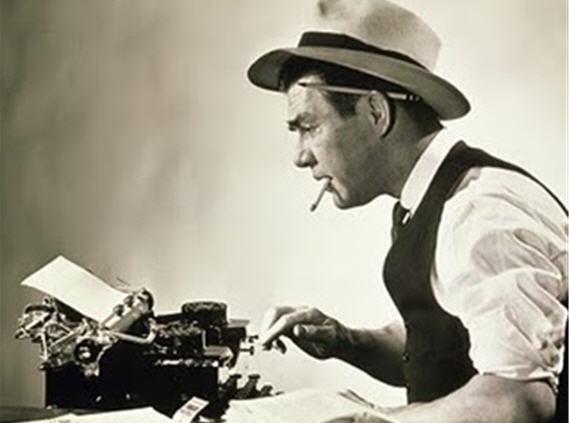
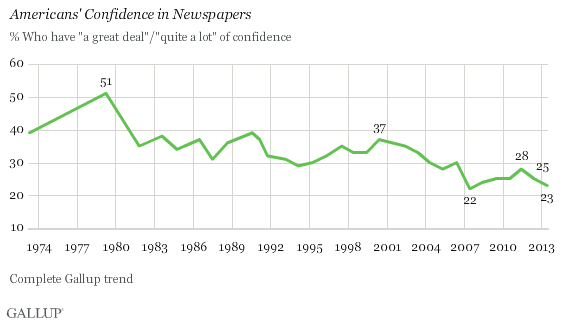
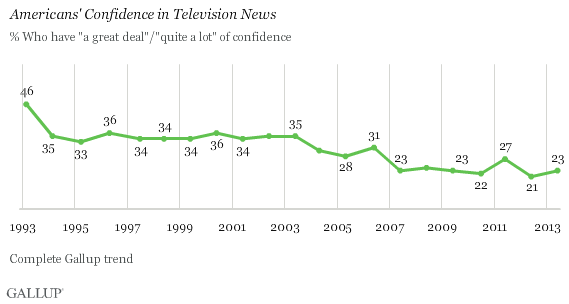
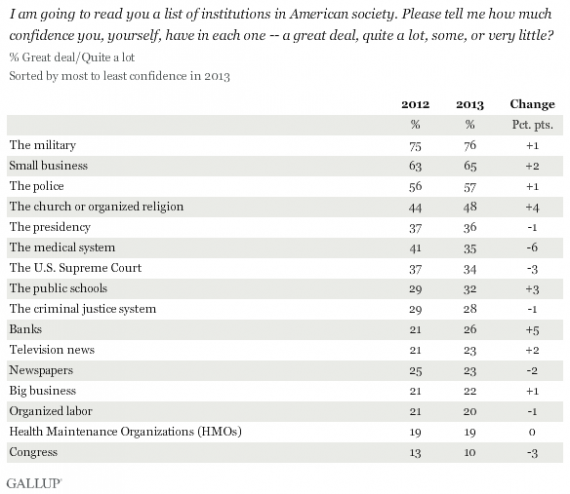

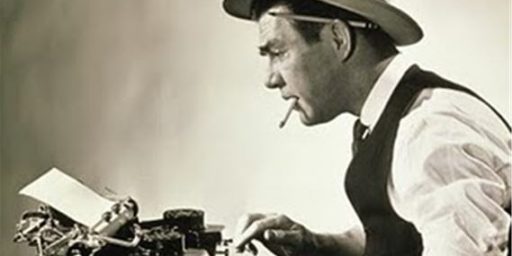
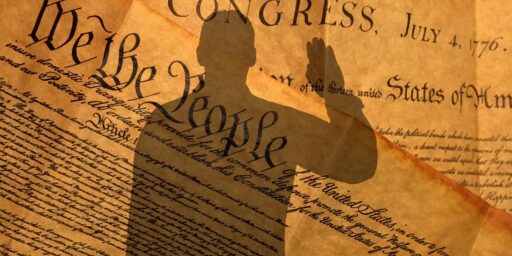
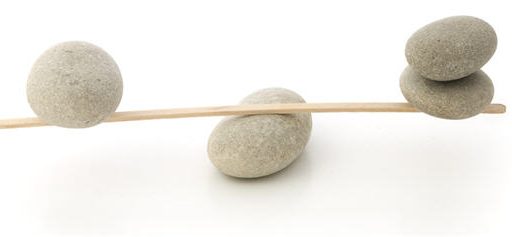


You’ve got to wonder what it is they’re actually measuring. I suspect it’s not confidence in an institution, but rather the willingness of people to say that they have confidence in an institution. That would translate to respect for the institution, or to the perception that you’re supposed to respect the institution.
How do you win back trust? How does a spouse caught cheating win back trust? Sometimes you can’t. Other times you have to listen to the other person’s complaints and change yourself. Most of the time you have to slog it out day after day with flawless behaviour, just trying to get back a little of the trust you’ve lost.
As with most surveys around the news, I have to wonder, to what degree, the starting numbers are actually the aberration. I suspect that if we had numbers dating back to the turn of the twentieth century, we’d find that polling actually started around this level and increased in the World War II and post-war era, peaking around Watergate and then started to drop back to pre-war levels.
My suspicion is that most of the “faith” in the media had more to do with a very unique period of media/news consolidation.
As we move back to a fragmented news environment (which more closely mirrors the way things were from turn of the century to the 20’s in most American cities), general trust in any one source returns to similiar levels.
Disconcerting but hopefully not surprising. It’s pretty much the exact message that been pounded into Americans’ heads over and over and over from specific corners of the media. I imagine you can guess which corners.
Ironic that for years Liberals have been accused of just hating this country to pieces. I’d argue the script has been flipped.
@Andrew E.: That’s the comment that jumped out at me. Immediately had flashbacks to 7 Days in May as well as depression-era Europe. There’s a warning here for all of us.
It is shocking 18% of conservatives still have confidence in television news after the election. How much confidence could you have in an institution that told you time and time again the polls were wrong, Romney is gonnna win, we’re taking back this country, etc? Those 18% are likely thinking about something besides Fox. However, despite the polarization of the country that has occurred in recent years, I think that at least where I live local nightly news has done a good job of appearing neutral.
So much for “wisdom of the people,” right?
Am I going to trust an institution which expends valuable resources showing me that George Will doesn’t believe in climate change, and that according to Mitch McTurtle all americans will be better off if we could just cut Mitt Romney’s taxes some more? And treats me to Papaw McCain’s jabberings every Sunday?
No.
Not much of a wonder. It is easier to research and learn the truth so the weak and often purposely slanted reporting is readily identifiable. Same goes for the other institutions, available information or at least competing opinions means less trust and more show me.
The more you know, the more you realize that “journalists” don’t know much and are very comfortable publishing out right lies to meet their deadline. And I’m not meaning politics, puff pieces on such things as medical practices, gardening, et al. If they can’t get simple research right, how can you trust the when politics are involved and the actors are actively trying to “manage” the press?
But this is not new. Way back in the late ’80s, I picked up a new magazine on marine navigation, I don’t remember the name. Remember this was the premiere issue and they had a long article on nautical charts. Well, the author, using ignorance beyond belief, stated outright, after listing all the ways the depth on a boater’s depth sounder needed correcting to get actual depth, that NOAA put the soundings that the depth sounder showed instead of corrected (actual) depths on the charts. This lie could get someone killed and revealed a complete lack of any research, like say calling the federal agency that actually produced the charts, on the part of the author. I sent the article off to the charting people who forced the magazine to publish a major correction to a story integral to their entire purpose.
Now, such errors are easier to detect and it is easier for those with real knowledge to get the word out, as Dan Rather discovered among others. Every time you publish a lie or gross error, trust is lost and is not recoverable without the total removal of all involved. But generally, something else arises to replace the untrustworthy entity.
The high opinion of the police is odd since the Supreme Court has ruled that they are untrustworthy in personal interactions with citizens while performing their official duties. Well, actually, they ruled the police can lie to people with out recourse but the implication for the citizen is that police cannot be trusted to tell the truth or rely on any promise or contract they make, i.e., you need a lawyer to ensure any contract verbal or written is enforceable.
Much of media today seems to be more about sensationalism! Who cares if real facts are even mentioned! All trying to grab the best headline so they can be first with ‘breaking news’! It really is a sad state of affairs.
I work at a big-box store which employs a lot of Fox News-heads. Let’s call it Gnome Repot. Being a numbers guy, and knowing Obama had 4-1 odds over Romney, I bet one of my co-workers a steak dinner that Obama would win. He was so confident he wanted to double the bet and include our girlfriends. I declined the double, not wanting to make an enemy–my objective was to make that small pinch in his wallet nudge him to understand that ailes/limbaugh were misleading him. He lost. Do you think he started questioning his sources? Nope. “Well it turned out there were more takers than makers” was his analysis after the election.
I’d argue that its a good thing that people (of all political stripes) don’t trust the media. In fact, that’s the attitude you’re encouraged to take in most serious endeavors – its the basis of science, of critical thinking (at least as taught in introductory philosophy and critical thinking courses), of art, even of sports.
What’s the saying? Don’t believe anything you hear, and only half of what you think you see?
Not trusting public institutions is more of a problem, though even there having a “prove it” attitude towards what they tell you is probably better than the alternative.
I don’t think it has that much to do with political leanings, as the numbers probably alternate depending upon who’s in power (conservatives more likely to trust during GOP administrations, progressives during Democrat administrations). Which of course is another reason to remain skeptical until proven otherwise.
@Caj: Much of media today seems to be more about sensationalism!
I think it’s a consequence of the change in newspaper writing. We’ve gone away from the “5 Ws” to telling a story with a point of view. What happens when you do that is that either readers gravitate towards outlets whose prevailing point of view coincides with their own or they lose confidence in the outlets or both.
Television news? Newspapers? What are those?
My TV doesn’t get any channels. Never bought the gov’t. subsidised Digital Converter. No CATV at my address. Dropped DirecTv when I started living on a fixed income (SS).
Stopped laying out 75cents/day and $2 on Sunday for the local rag when I could get most of it for free on the ‘net. Then they started charging 99cents/month after 10 (very short) items.
I’m not paying that either.
I do see alot of sports on TV, just not at home.
Other than that my most complete source of information is on line.
Apparently “on line” is not yet an American Institution.
I wonder how much of this distrust is about standard reporting of the news by largely semi-anonymous reporters (say, Charlie Savage of the NYT) compared to celebrity media types (Friedman, Will, Halperin et al). In other words, are we polling verity or personality?
What do we want: truth or belief?
No question, without an independent media, a true democracy is impossible.
@ernieyeball: The convertor boxes are great. Most stationss that used to broadcast one signal now put out two or three, and there’s often things I’d rather watch than the primary channels – a lot of old TV shows and movies. Magnum PI on Thursdays, Stargate SG-1 on Sundays, I’m set.
@Pinky: I suspect the $30 Off cupon that I downloaded and printed out several years ago has expired. My tough luck!
I still play DVDs on my tube. Law and Order and the like. Ren and Stimpy Complete First 3 Seasons…Simpson’s are on line…don’t need much else at home…
It’s notable that the confidence percentage is fairly flat through the nineties into the early aughts (which is when the FCC relaxed rules regarding how many media outlets a single entity could own in a market) after which it starts a steady decline.
I’m also not sure how I’m supposed to take a FOX News viewer’s complaints about “confidence in media” seriously.
So if the rules are tightened up and ownership of media outlets in a market is again restricted, “confidence in media” will then rise?
@ernieyeball: I didn’t use the coupon. I had no interest in a government subsidy to do something I was going to do anyway. A little victory for the individual and the market.
Looks to me like you’re out 30 bucks…
@ernieyeball: Not necessarily. Just because the company sells it off doesn’t magically fix it overnight, but it is a step in the right direction and creates conditions that are more favorable to improving confidence.
I do think the Republican (actually, anyone’s) lack of confidence in the media today is justified, given the level of personal bias, unprofessionalism, and stunning lack of objectivity in many corners of the modern median, particularly the vacuous realm of cable news. Ironically, of course, the opinion shows of FOX were one of the leaders in this category that really led the other channels to follow suit, particular that johnny-come-lately, MSNBC.
Of course, I think the real reason the distrust might be so higher among Republicans is because of a tendency to be more comfortable in the echo chamber, best exemplified by talk radio, where you either agree with the majority conservative opinion or do not – in which case you are shouted down, humiliated, or passed off as a far-left communist-fascist-socialist-Muslim sympathizer. Therefore, when faced by opposing opinions in the “mainstream media” they instantly call bias (though it definitely exists in a lot of places, for example one of my favorites, NPR, is usually great, but sometimes you can definitely see that their reporters usually lean liberal) when it may not exist.
is this because nobody really buys newspapers anymore? it’s anti-environmental to kill trees for stuff you can find online. plus, print news is already a day or 2 old by the time you get it- i only read one if i’m traveling and bored to tears.
One of the changes over the last 30 years is the concentration of ownership in media, as this chart from Business Insider demonstrates. http://www.businessinsider.com/these-6-corporations-control-90-of-the-media-in-america-2012-6. These corporations found that “entertainment and infotainment was far more profitable than news gathering.
Ted Turner will tell you the worst business and journalist decision he made was selling CNN to Time-Warner.
Even the news organizations not on this list, The N.Y. Times, WaPo, PBS, and NPR have shifted their priorities and coverage to reflect the dominated media culture of the trivial and the stupid. And the Associated Press is now dominated by these 10 organizations and far to often takes its lead from Politico and Drudge in its stories.
Still, your site, along with Talking Points Memo, Pro Publica, the Guardian, Calculated Risk, Business Insider, Economists View, and McClatchey all provide, at times, great journalism and stories that can make one an informed citizen with a lot less effort then it took in 1980.